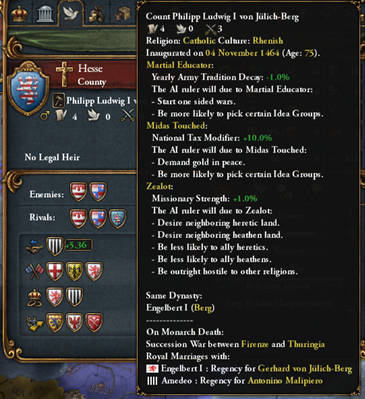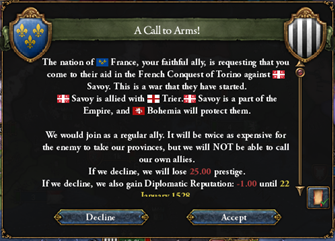Chapter 17 – Better relations through war.
The duke took a deep breath to analyze the internal situation and maps after the first series of religious wars. Per his last count, 41 countries followed the faith, almost the same number of Catholics who were at 50, and largely passed the Protestants at 15. He favoured to let the ranks recover for some time and let his but mainly his vassals’ war exhaustion to decrease. Amedeo took notice that while at peace, the fervor of the realm could maintain full time the diplomatic focus, which was important for the fishing strategy with two countries on the hook at that time. After a while he would consider options.

Unfortunately for his plans, the inexperienced French king had the brilliant idea (not really) to called him to a war against the one province minor Savoy, which already was on the list to convert, along her allies. Saying “no” to the request would represent lower prestige, diplomatic reputation and losing the alliance with France, all of which was intolerable. Reluctantly, Amedeo accepted. And since an outsider had attacked a member of the HRE, the new emperor and powerful Bohemia was in the war.
The duke was able to pass the final influential idea, finally allowing to start gathering resources afterwards to resume as soon as possible the diplomatic integration of vassals, with Tripoli as the next candidate. The Government capacity increased as the final Florentine Idea was fulfilled as well, with the added bonus of increasing the goods produced in every province, completing Manfredo’s ambition.
A new policy to aid beyond the nation’s frontiers was implemented as well, increasing the duke’s reputation and relieving the Foreign Affairs office.
In an effort to improve the relationship between Firenze and her neighbors, Amedeo let pass a diplomatic insult from Bar, and sought to ease the tensions with the fellow believer nation.
Brazil and Morocco were converted, and lands of the latter developed to keep them loyal. In the meantime, the duke was using every diplomatic at his disposal to increase the relations with other princes during the war. And with the armies coming and going throughout the HRE provinces, Amedeo’s forces focused on the capitals, with the Savoyard being the first to fall. But the duke didn’t transfer the occupation to France.
Even the relations with the corrupt Pope improved thanks to trade with the 3 disconnected provinces across central Italy.
The Saxon capital fell shortly after, and the army proceeded to fully occupy the country. So did the capital of Mainz. But when the duke saw that he couldn’t convert those princes since he was a secondary participant, he thought about signing a separate treaty with Savoy, asking only for their acceptance of the Reformed faith, letting the French to pursuit war against the empire on their own. The lost trust would be recovered with favors. However, since the war hadn’t lasted more that a year, there was a very high prestige penalty. Amedeo decided to wait.
The fishing strategy was (finally) successful in Hesse, who became a Personal Union under Firenze. The Thuringians chose wisely to not contest it. The Hessians turned rapidly to the true faith after the duke asked nicely for them to do so.
Not interested in the French war, and without the prestige penalty, Amedeo signed peace with Savoy for their conversion only. Freed to attack princes again, he adopted his new PU’s claims to his advantage.
War was declared in March 1524 over Nassau, allied to the elector Trier, Liege and Osnabruck. At the same time, Tripoli started her integration into Firenze. The first serpentine claim from Alessio’s map, one in Switzerland, fade away, made Amedeo remember that those were not permanent, but at the same time relieved that he acted on time. Internally in the council, troubles were steering against a favorite of the duke. He sacrified legitimacy to keep his stateman around.
For what had become a tradition, a Malipiero was elected once again for the Polish throne, and the customary gift of resources filled the Florentine coffers. Sadly, the fishing trip in Brandeburg didn’t went as expected when they introduced an heir, and the marriage dissolved into dust. (Here the pipeline may had worked, dammit)
It was not surprising that even before the first war concluded, Amedeo declared another, this time in Thuringia and allies, including the shameful Elector Brandenburg, who was named co-belligerent, as was Styria. The conversion wars persisted.
Once their capitals fell, in succession every combatant in the Nassau war signed treaties of remorse, penance, and solemn swearing to adhere the Reformed faith. Trier was the third elector to do so. A new tier was achieved.
In another personal tragedy for Amedeo, the duchess consort died.
This loss was partially balanced when Tripoli completed annexation, and the lands were given to a trade company as the rest of northern Africa. The miraculous heir Antonino reached adulthood and discovered his fascination with ships, which was symbolically fitting to his discovery in the waters.
In a late response to states slipping through his hands, the Pope made a weak attempt to remediate problems, with practically null results. England failed in his own endeavour as well and repentantly returned to the Catholic pen.
Meanwhile, more and more nations accepted Amedeo’s plea to surrender and hear the Word. After Berlin fell, the Brandenburgian regent opened his ears and heart and accepted salvation signing the peace treaty, the 4th Elector.
The war continued until the rest of the combatants’ capitals were in ruins. Bosnia, Styria, Saxe-Lauenburg, Magdeburg, and finally Thuringia finally submitted to the Lord’s and the duke’s will.
Further claims from the serpent map crumbled into history, something that made Amedeo sighed resignedly. He had seized opportunities, succeeded in a handful and lost a few others. It hadn’t been perfect. He had made his best effort. The faith had grown, from Brazil to Anatolia, among Moroccans and Burgundians, and throughout the HRE. There were more Reformed countries than Catholic.
Some wars could still be fought, and Amedeo would have to fight them smartly. Luckily for him, Firenze was richer than ever. Many fellow creed nations admired and even loved him as a prophet. He knew he had responded to the call. And had improved the relations with countries thanks to, despite, and during, conflicts. He thought it was a paradox aimed for philosophers, not a simple fervent believer. But he humbly accepted and would kept encouraging it. For as long as needed.










































